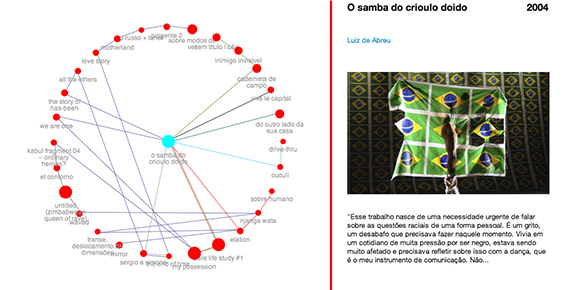Luiz de Abreu
Luiz de Abreu is a dancer and performer whose key subject matter is the black body. With a background in classical ballet, he had his first contact with dance at umbanda parties and rituals. O Samba do Crioulo Doido (a title inspired by a song by Stanislaw Ponte Preta) is a project the artist developed approximately ten years ago, as he tells VB Channel. The piece is autobiographical: “O Samba... speaks of me, of my black history. It’s a dialogue with my country. I am a dancer. This is my language, my way to communicate,” he tells PLATFORM:VB. In 2013, the piece was presented at the 18th edition of Festival Videobrasil.
The setting and unravelling of O Samba do Crioulo Doido are classically structured: the dancer enters the stage, the curtain opens, the audience watches the piece while facing the stage, and the performance ends. However, Abreu departs from the canonical presentation as he creates new moves and corrupts the terms that name them: “In classical ballet, a frappé means stomping your foot, while in O Samba I wiggle my butt and call it frappé de fesses. The same holds true of ronde bitte: I whirl my penis, while in classical ballet this move is called ronde jambe. Why not?”.
The stage, full of Brazilian flags, is a reminder that this black body, which we pretend to have completely accepted in our history – a key element of “export-type” Brazilian culture –, is also plagued by veiled racism on a daily basis. “The desire to create this piece did not originate from any particular situation; it was part of a process that took years. Being stopped at the door to the bank, being followed by security at drugstores. I felt discomfort in the world. I wanted to understand: what is it with this body that is so bothersome?” the artist inquires. The “Afro-descendant”, so strongly associated with the national image, incarnates oppression as an inheritance from his trafficked great-grandparents, enslaved, and stripped of their families, their rituals, their language and culture. “All that’s left is this body which resists until this day, where our entire memory is contained,” Luiz declares.
Abreu talks about his piece as an attempt to define the condition of black people in Brazil
In O Samba do Crioulo Doido, Luiz de Abreu performs almost naked, wearing only high-heel silver boots – the shoes, which signified freedom to slaves, adorn the black body so often relegated to the exotic, the sexual. The skin is his costume, and is also what the performance is about. The performer dances, smiles and waves at the audience to entertain it, like an anatomical novelty, like a body exposed to the sound of chorinho and of a feijoada recipe in French. The song A Carne, sung by Elza Soares, punctuates the performance.
O Samba do Crioulo Doido highlights the importance of taking ownership of the black identity and employs stereotypes and objectification in order to destroy them.
Luiz de Abreu has presented his work at festivals such as Brazil Moves Berlin (Berlin, Germany, 2005 e 2007) and In-Presentable (Madrid, 2008). He also won a prize from Programa Rumos Dança (São Paulo, Brazil, 2003/2004).
Learn more about the artist:


